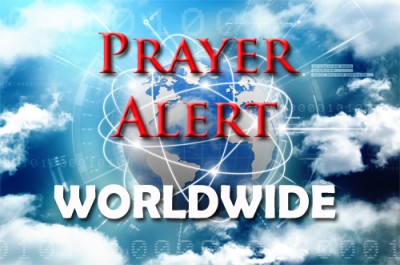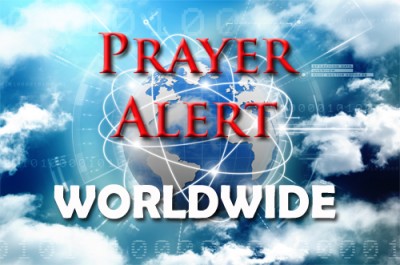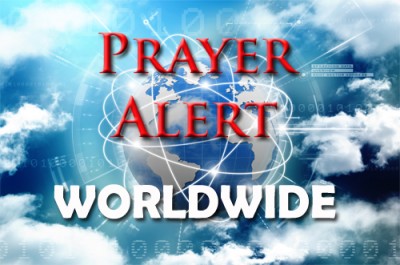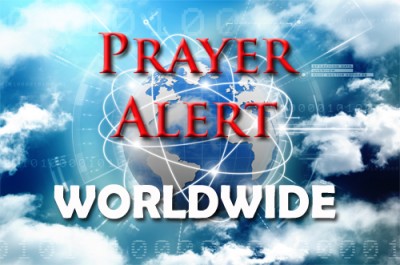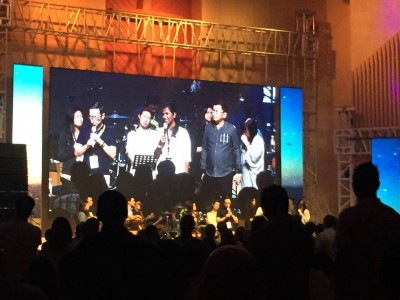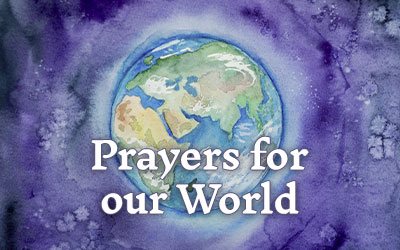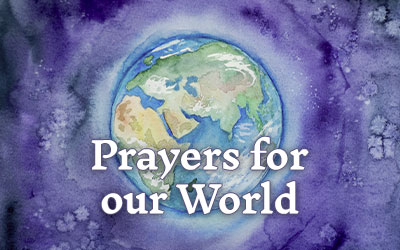Vietnam: protesters beaten by police
02 Sep 20164,000 Catholics were beaten by police as they protested against the government allowing the contamination of seventy tons of fish from waste dumped into the sea. The pollution was caused by Formosa Plastic Group, a steel company. Christian fishing families affected by the pollution marched on municipal offices in Ky Anh, but were blocked and beaten by police, leaving several injured by truncheon blows. Officials deny that police used violence, saying people were injured because of the size of the crowd. International Christian Concern noted that the dying fish have left many families in a state of panic as fishing is a vital and important source of income and food. Pollution will also have an impact on the economy if the situation continues without proper counter-measures. Please also pray for an end to Vietnam’s harassment and intimidation of religious minorities as countless Christian pastors remain in prison merely for their beliefs.
MAF: flying for life
02 Sep 2016For seventy years the Missionary Aviation Fellowship (MAF) has helped vulnerable people in hard-to-reach places. Flying onto desert and jungle airstrips, lakes and rivers, tracks and roads, its light aircraft and their mission pilots go the extra miles to provide a lifeline, working in partnership with other Christian and relief organisations. They have now started a new initiative that they hope will increase prayer support for their work. Each month they will produce a short prayer video that brings the needs of those in remote communities into people’s internet mailboxes. This fresh approach highlights the stark differences between life in the west and some of the countries where they serve, prompting people to call on our heavenly Father with thanksgiving and praise, while seeking His provision for others. To watch the video and pray this month for those lacking access to clean water please click the ‘More’ button.
Australia: online schoolgirls pornography ring
02 Sep 2016An online pornography ring targeting thousands of Australian schoolgirls has re-emerged after police had closed it down earlier this month. Police and detectives in several states are investigating a website containing sexual images of girls from private and public schools across Australia. The website is in the form of a ‘message chat forum’ and has photos and requests of naked schoolgirls. Seventy Australian schools are mentioned in the requests. Detective Acting Superintendent Marcus Boorman said a number of the images allegedly depict non-consenting or underage girls. The page reportedly features naked photos of teenage girls, some with their names, so that others can rate them. NSW, Queensland, Victoria and ACT police are investigating - as are a number of education departments. However, it is difficult for law enforcement agencies to keep track of online sites, especially those hosted overseas. See also Australian Prayer Network.
‘Passion of the Christ’ sequel?
02 Sep 2016In a surprise announcement, Mel Gibson told evangelist Greg Laurie that he is working on a sequel to his film ‘The Passion of the Christ.’ Gibson said, ‘We're talking about that. Of course, that is a huge undertaking. And you know, it's not “The Passion 2”. It's called “The Resurrection”. Of course, that's a very big subject and it needs to be looked at because we don't want to just do a simple rendering of it - you know, read what happened. The Passion is the beginning and there’s a lot more story to tell.’
UPRising feedback
01 Sep 2016It was a tremendous privilege to be part of this gathering of young people who came together in South Korea with a mandate to pray for the unification of the north and south. Over 37 nations were represented and over 1,000 mainly young people gathered daily in Ilsan Kwanglim Methodist Church just outside Seoul 26 – 29 July. There were 26 attending from the UK; and they were all blessed, challenged and loved interacting with people from the nations. We received an email when we returned from one of the guys from the UK he said, “Personally, this trip was probably one of the most significant moments in my life and ministry. I feel the Lord has reoriented my ministry and destiny.” How amazing is that and such an encouragement.
We were collected each morning at 08.45 and returned most nights at 22.45 so they were long days but we survived! The Methodist Church was an amazing venue with lots of space for people to eat, rest, break-out areas, very large auditorium; we with other leaders were in a VIP lounge where we were looked after and fed lunch-time and evening, not sure what we were eating some of the time but we survived! There were nine worship teams from Philippines, Malaysia, four from South Korea and an International Team; they were all anointed teams and many times during the week, Heaven touched earth through the worship.
We had speakers from Philippines, two from Korea, Germany, Singapore, Indonesia and Dr Michael Brown who is a professor of Bible and Hebrew studies at several seminaries. They were all appreciated by the content they shared. Ian spoke with John Robb and Brian Mills from International Prayer Council at one of the breakout sessions on unity.
One of the sessions on the final evening at the church was praying for all the nations represented individually, praying out all together with bullet prayers. People from each of the nations represented were asked to stand, those close laid hands on them and the rest prayed together – Korean style – it was a real roar of prayer for each nation. Many of the young people said they had never experienced anything like this before – especially the Brits.
The highlight for most people was the visit on the Friday to the DMZ at the border of North and South Korea. We were collected from the Methodist Church on the Friday morning and drove in many coaches for about an hour to the DMZ. We had time to walk around the area where there were coffee shops/restaurants and other amenities as well as information and photographs of the area before the north and south were divided. Much of the journey to get to the DMZ was along the estuary where there were double high fences with barbed wire across the top and century posts at regular intervals looking out for defectors from the north.
We had an amazing miracle on the Friday; the forecast was severe thunder storms and lightening with heavy rain all day. When we woke, in our room on the 17th floor of the hotel, the rain was lashing at the window and severe thunder and lightning; an urgent email was sent out by John Robb to pray-ers across the world to pray that this would stop. God answered prayer! Where the worship event took place was in an uncovered grassed area like a huge amphitheatre with the stage at the front. The prayer and worship commenced at 3 p.m. and continued until 9 p.m. and it was dry for the whole time apart from a short shower when the worship band started singing the song, “Let it rain.”!! The evening concluded with all the lights turned off and all the leadership coming to the front of the stage (us included!) and one candle was lit, this one candle lit another one and so on when all the leadership had lighted candles we then went and continued to light everybody’s candle in the amphitheatre; praying that the light of Jesus would shine brightly into North Korea; a very moving and powerful moment.
The young people did extremely well in leading each day; there was real unity and honour of each other from the different nations. It was special to be able to affirm and encourage them; once or twice Ian wandered over to them when they were a little hesitant as to what to do next and offered a suggestion; they were very grateful for his fatherly input. We also had lots of fun with them in the VIP lounge, so much laughter and we’d never had so many selfies with people in our lives; everywhere we went, “can we have a selfie with you.” What it is to be popular! Much of the gatherings were live streamed and we know of many people around the world who tuned in.
Ian & Pauline Cole
Europe is reeling
01 Sep 2016Europe is reeling. Germany has suffered terrorist attacks and a growing political crisis over refugees. France has fresh presidential elections in 2017 and has been buffeted by a series of horrendous terrorist attacks and a growing unease across different ethnic groups. Belgium has also been caught up in terrorism. Greece continues to struggle against the huge problems of austerity whilst again having to support hundreds of thousands of migrants. Spain is in a period of great political instability with one scenario suggesting that a fresh general election will need to be run on Christmas day! Italy has suffered a major earthquake, is struggling financially and is processing and supporting thousands of migrants leaving Africa via Libya. Ukraine has lost nearly 10,000 citizens, killed since February 2014 and seen 2 million people displaced. On top of all of this is Brexit. We are yet to see the full impact on Europe’s economy and politics and even on the sustainability of the EU. These are challenging and difficult times with the likelihood that things will get worse.
This is an important time to pray for Europe and there are three spiritual dimensions to add in.
- 2017 sees the 500th anniversary of the reformation – this was a great and wonderful period which started as a renewal of the Catholic church but led to a rediscovery of biblical truth and a fresh revelation of God’s mercy and salvation. God fundamentally changed many nations in a short period of time. Millions came to Jesus. Pray for the revealing and re-digging of the wells of salvation across Europe.
- The UK has a specific call to bless Europe - the dynamics around this have changed with Brexit – Lord, we pray You will prepare a way for the gospel to go from the UK into Europe, and You will call and prepare British people to be bringers of mercy and hope to Europe.
- We believe 2017 is a key year – it is time for the gospel, it is time for a strong move of God globally. Lord have mercy on Europe, forgive our sins, touch the young generations and create a new movement of people who will ambassadors for the kingdom of heaven.
God is a God of mercy – Paul writes to the Romans - I will have mercy on whom I have mercy, and I will have compassion on whom I have compassion.” Paul continues -salvation “does not, therefore, depend on human desire or effort, but on God’s mercy.” (Romans 9. 15,16). God’s heart is that people cry out for His mercy, and come to Him to change and fill their lives. Sadly this often comes though trials, challenges, and shaking. Europe is very vulnerable, please pray protection but also pray for God’s will to be done that the nations of Europe will come to Jesus. In uncertainty He is the rock, in darkness He is the light, in brokenness He is the healer.
Dear Prayer and Ministry Leader,
You are invited to an assembly of national prayer, denominational, and kingdom network leaders from across the nation. America is at a historic crossroads with growing threats within and without. It is a tumultuous election year and an absolutely pivotal time in our history. A dysfunctional and divided government has become increasingly ineffectual in dealing with our growing national problems, including a $19 trillion debt hanging over our heads. In addition, our society is becoming progressively more apathetic and cold to the things of God. Surely, we need a new Great Awakening to turn America around.
A critical component in this pursuit of awakening is the coming together of both America’s prayer and denominational movements to seek His face. We need to join forces, praying with one heart and mind for a fresh, massive outpouring of His Spirit that will bring revival and transformation to the United States of America.
It is time to gather ministry leaders for two days of concentrated intercession, listening, and sharing what God is saying to us. As in the National Prayer Assembly of October 2014, we will have brief reports from experts on the critical issues facing the nation. Our approach will be to pray at least twice as much as we talk. Earlier assembly participants felt this was the right balance, so we will endeavor once again to let the Spirit of the Lord reveal, inspire, and pray out His heart concerns through us for our nation.
Listed below are some of the issues for our prayer focus at the NPA.
Please note that the NPA is by invitation only, so please only forward this invitation to others who serve as leaders or coordinators of prayer ministries, national or denominational ministries, or kingdom networks.
We look forward to your being with us for this crucial time of encountering the Lord together on behalf of our beloved country.
Every blessing in Christ,
Dave Butts (National Prayer Committee)
Rickie Bradshaw (Pray Houston)
Pierre Bynum (Family Research Council)
Paul Cedar (Mission America Coalition)
Lisa Crump (National Day of Prayer)
Kay Horner (Awakening America Alliance)
Dave Kubal (Intercessors for America)
Daniel Lim and Doug Conder (International House of Prayer)
John Robb (International Prayer Connect)
Prayer Assembly Participant Details:
Schedule:
- 8 a.m. to 9 p.m. Thursday, October 27, 2016
- 8 a.m. to 5 p.m. Friday, October 28, 2016
Registration fee: $120 per person. You must register each person individually. The fee will include beverage service throughout, lunch on Friday, and our meeting space overlooking Washington, D.C. We are encouraging both prayer and fasting as part of the Assembly if you are able to do that for the first day of this gathering. In addition, a 40-day call to prayer with fasting up to the election will be in progress having begun on September 30.
To Register: https://intre.org/?297
Venue: Sheraton Pentagon City, Arlington, VA
- Reagan National Airport (DCA) is nearest airport.
- Shuttle service is provided to hotel.
- Special conference rate is $179/night per room (for twin sharing if desired)
To reserve your hotel accommodations please click here:
https://www.starwoodmeeting.com/events/start.action?id=1603180291&key=101F35BB
For other questions about logistics, please contact Lisa Crump with the National Day of Prayer Task Force via email: This email address is being protected from spambots. You need JavaScript enabled to view it..
Preliminary Prayer Emphases for the NPA:
- Repentance for-
Corporate sins of America
Sins within the Church and Society
- Reconciliation and healing of-
Leadership division
Racial division
Restorative justice
- Restoration of-
Spiritual revival and morality within the church
Truth in media
Morality in arts and entertainment
Integrity and blessing in marketplace
Protection for marriage and the family–an institution under assault
Truth and protection in educational institutions
Sanctity of human life and protection of the unborn
- Reaching and evangelizing the lost
Prayer-care-share lifestyles among Jesus followers
Provision and mobilization of missionaries
- Government and the national election
Religious freedom
Court decisions
Legislative actions
- Prayer movement
Unity
Strength
Mobilization
Engagement
- Next generation
Children
Youth
Emerging Leaders
- False religion and the occult invasion
- National security issues
Military forces
Law enforcement
Homeland security
Radical Islam and ISIS threats
By Dan Cummins, Associate Pastor of Skyline Church in San Diego and convening pastor of "The Jefferson Gathering" worship services in the US Capitol.
“Do I believe America is in a period of judgement? Yes! Most definitely. God has given us over to our selfish desires. Yet the biblical pattern for national revival is almost always preceded by a time of judgment. "The judgments of the Lord are true and righteous altogether."
Psalm 72:16 and Micah 4:1-3, clearly state that in "the last days" God will take a remnant of believers (wheat) and plant them in the tops of world governments (tops of the mountains) and build "the house of the Lord," beginning in the top levels of the world's governments. The resulting consequences of God's moving in world governments would then shake the earth with revival. "Come, let us go up to the mountain of the house of the Lord."
I can confirm that this is beginning to happen in Washington, D.C., London, Ukraine, Poland, Moscow and several nations in Africa.
Add to this, when the "last trumpet" in Revelation sounds, "the kingdoms of this world" (governments) become the governments of the Lord Jesus Christ and He will rule them forever with His glorious church (Rev. 11:15-19). So much for "separation of church and state."
Almost always, following these periods of captivity and judgment were times of transition to revival. These times of transitions were times of national repentance followed by "times of refreshing" or the latter rain.
So could America be in one of these transitional times of repentance where our national sins are being exposed? Are the wheat and tares being exposed before a time to shine like the sun in righteousness?
How can a nation, which for years has been praying for revival, actually "turn from your wicked ways" until those wicked ways are openly exposed for all to see? Could this be what we are witnessing now in America—unprecedented exposure of corruption at every level of society and government—so God can heal us? So we know what to repent of?
If so, now is the time for the prophets to come forth and prophesy to the nation. Now is the time for the preachers to preach repentance and godly holiness to the church—to make herself ready to enter the kingdom.
Is God through with America yet? I don't believe so. I think America's greatest days may be just around the corner. I believe we're in the first dawning hours of another Great Awakening.
In fact, I believe God has been silently, behind the scenes, answering our 2 Chronicles 7:14 prayers for some time now, not at 1600 Pennsylvania Avenue (the White House) but at First Street and East Capitol Street, in the heart of the U.S. Capitol with the 114th Congress.
Did you know, for the past two years, weekly Christian worship services for members of Congress and staff, called the Jefferson Gathering, are being held in the Capitol building after an absence of 144 years? More than 150 members have attend in two years and many now attend on a regular basis. Several people have given their lives to Christ.
Did you know there are more "passionate followers of Jesus Christ" (I prefer this to the overused sometime meaningless term, "Christian") in the 114th Congress than at any time since President Calvin Coolidge? There are. We are working with close to 200 sincere followers of the Lord in the House and Senate.
Did you know, on occasions, as many as 90 pastors will be praying together in the Capitol Rotunda while the House of Representatives is debating controversial freedom of religion amendments on the House floor? Did you know that, on most Wednesday evenings, prayer for America is happening in the Rotunda? It is!
Have you heard? Beginning on Sunday, Sept. 4, three Christian worship services will begin in the Ways and Means Room in the Capitol building for all federal employees and Capitol Police. It's been 150 years since regular Sunday church services were held in the U.S. Capitol. This is big news!
How did this all begin to happen? America has been praying, that's how! And God is right now in the process of answering those prayers by raising up godly men and women in Congress, the most important branch of government…
This is unprecedented and historic! This is God answering our prayers.
In September, we'll be hosting four worship services weekly in the U.S. Capitol with Ryan's permission and blessing…
Let me ask you this question: Which is more important for America: Repealing the TPP, building a wall at our border, balancing the budget, restoring jobs or experiencing a third Great Awakening? Without a spiritual awakening, America will still go to hell in a handbasket. We must have revival!..
I'm thankful that the top four leaders of the Republican Party in Congress (Speaker Paul Ryan, Leader Kevin McCarthy, Whip Steve Scalise and Chairwoman Cathy McMorris Rodgers) know this and are doing what they can to see it happen. They know that, without it, America has no hope. These are the leaders America needs now.
America's political revivals have always followed spiritual awakenings. I am convinced the underpinnings for a third spiritual awakening are happening now, and the foundations for political renewal could be just ahead.
Keep praying, and keep voting. God is not finished with America yet.”
From “What CNN and Fox Won't Tell You About the Move of God”
Charismanews.com
Let’s keep these leaders of the Congress in prayer and above all ask the Lord for a new Great Awakening as has happened in U.S. history. Why can’t it happen again now?
